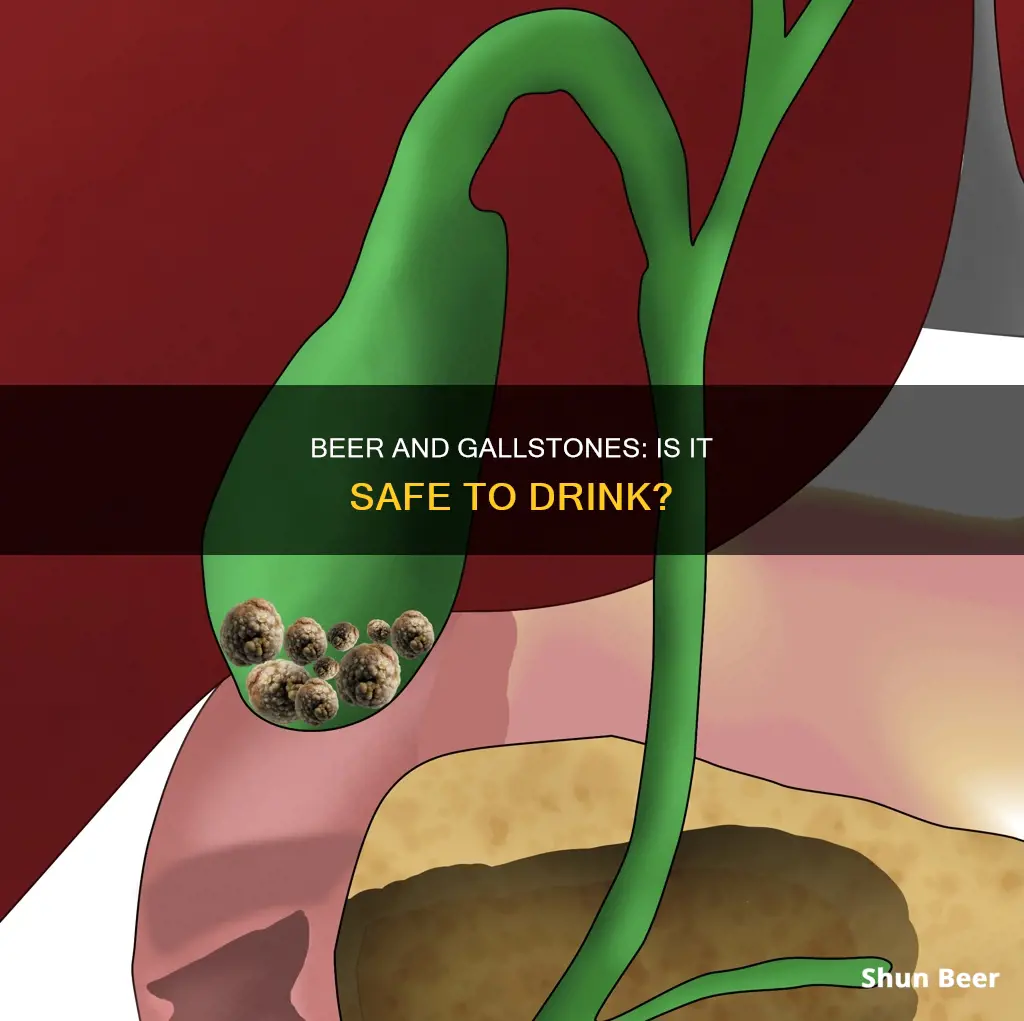
Alcohol consumption and gallbladder health are linked, but the nature of the relationship is not yet fully understood. While moderate drinking may lower the risk of gallstones, heavy drinking can cause cirrhosis, which is a risk factor for gallstones.
| Characteristics | Values |
|---|---|
| Can alcohol cause gallstones? | There is no evidence to indicate that alcohol can cause gallstones. |
| Can alcohol help prevent gallstones? | Limited research suggests that moderate alcohol consumption may lower the risk of gallstones. |
| How much alcohol is considered moderate consumption? | The Centers for Disease Control and Prevention (CDC) defines moderate drinking as 1 drink per day for women and 2 drinks per day for men. |
| Can heavy drinking lead to gallstones? | Heavy drinking can indirectly contribute to gallstones, for example, by causing liver cirrhosis, which can lead to gallstones. |
| Can you drink alcohol if you have gallstones? | It is recommended that individuals who already have gallstones avoid drinking alcohol. |
| Can you drink alcohol after gallbladder removal? | It is not recommended to drink alcohol after gallbladder removal as it can lead to problems like pancreatic inflammation, migraines, allergic reactions, and stomach pain. |
What You'll Learn
- Research suggests that moderate alcohol consumption may reduce the risk of gallstones
- Heavy drinking can indirectly cause gallstones
- Alcohol consumption is not recommended for those with gallstones
- Alcohol may cause problems with gallbladder emptying
- Binge or heavy drinking can lead to gallbladder problems and pain

Research suggests that moderate alcohol consumption may reduce the risk of gallstones
The gallbladder is a small pear-shaped organ located under the liver. It is part of the biliary system, which includes the liver and pancreas, and is responsible for producing, storing, and releasing bile, a liquid that aids in fat digestion. When the gallbladder receives a signal, it releases bile into the small intestine to help break down and absorb fats from food.
While moderate alcohol consumption may have benefits for the gallbladder, heavy drinking can have negative consequences. Heavy drinking is defined as binge drinking on 5 or more days in the past month, and it can lead to alcohol use disorder and increase the risk of various health issues. These include liver disease, heart disease, high blood pressure, stroke, and certain types of cancer.
The exact mechanism by which alcohol reduces the risk of gallstones is not yet known. One theory suggests that alcohol increases the rate at which the gallbladder empties, reducing the amount of bile that can form stones. However, research has not supported this theory, and some studies indicate that alcohol may actually slow gallbladder emptying. Another idea is that alcohol consumption may lower cholesterol levels in bile, as many gallstones are composed of cholesterol.
It is important to note that healthcare professionals generally recommend consuming little to no alcohol, as alcohol intake can increase the risk of various medical conditions. Additionally, individuals who have had their gallbladder removed should not drink alcohol, as it can lead to problems such as pancreatic inflammation, migraines, allergic reactions, and stomach pain.
Beer and Atkins: What You Need to Know
You may want to see also

Heavy drinking can indirectly cause gallstones
Cirrhosis is a condition where the liver becomes scarred and slowly stops functioning. This scarring can cause gallstones. Additionally, heavy drinking can lead to sudden weight loss, which is another risk factor for gallstone formation.
Heavy drinking is defined as binge drinking on five or more days in the past month. Binge drinking is defined as consuming more than four drinks in two hours for women and more than five drinks in two hours for men.
While moderate drinking may reduce the risk of gallstones, heavy drinking can have serious negative health effects. Therefore, it is generally recommended that people consume little to no alcohol.
Gluten Intolerance: Can Beer Be Enjoyed Safely?
You may want to see also

Alcohol consumption is not recommended for those with gallstones
While moderate alcohol consumption may be linked to a decreased risk of gallstones, it is important to remember that excessive alcohol intake can have various adverse effects on the body. Therefore, it is generally recommended that individuals consume little to no alcohol to maintain optimal health. This is especially important for those already dealing with gallbladder issues, as alcohol can indirectly contribute to gallstone formation and exacerbate existing symptoms.
The Impact of Alcohol on the Gallbladder
The gallbladder is a small organ located under the liver, responsible for storing bile, a liquid that aids in fat digestion. When we consume fatty foods, the gallbladder releases bile into the small intestine to facilitate digestion. However, if the chemical balance of bile is disrupted, cholesterol can crystalize and form gallstones, which are hard deposits that can block the bile ducts and cause severe pain.
While moderate alcohol consumption has been suggested to potentially reduce the risk of gallstones, the exact mechanism of this effect is not yet fully understood. On the other hand, heavy alcohol consumption can indirectly contribute to gallstone formation and worsen gallbladder problems. Here are some of the ways alcohol can impact gallbladder functioning:
- Liver Cirrhosis: Heavy and chronic alcohol consumption can lead to liver cirrhosis, which is a risk factor for gallstone development due to liver scarring.
- Acute Pancreatitis: Alcohol consumption can exacerbate pancreatitis, a condition that can arise when gallstones block the entrance to the pancreas.
- Bile Salts: Alcohol can lead to low levels of bile salts in bile, affecting its composition and function.
- Gallbladder Emptying: Some studies suggest that alcohol may slow down the emptying of the gallbladder, contrary to the theory that it increases gallbladder motility.
- Weight Loss: Excessive alcohol intake can lead to sudden weight loss, which is a risk factor for gallstone development.
- Bilirubin and Cholesterol: Alcohol can cause an increase in bilirubin and cholesterol levels in bile, potentially contributing to gallstone formation.
Recommendations for Individuals With Gallstones
For individuals who already have gallstones or other gallbladder issues, it is crucial to avoid alcohol consumption until advised otherwise by a physician. Heavy drinking can worsen gallstone-related symptoms and lead to additional health complications. Instead, it is recommended to focus on maintaining a healthy body weight, avoiding sudden weight loss, and consuming alcohol only within recommended limits to prevent the development of cirrhosis and subsequent gallstone formation.
In summary, while moderate alcohol consumption may be associated with a decreased risk of gallstones, excessive alcohol intake can have detrimental effects on the gallbladder and overall health. Therefore, it is generally advisable to consume little to no alcohol, especially for those already dealing with gallbladder issues, to prevent further complications and maintain optimal health.
A Day's Drinking: Beer Binge and Health
You may want to see also

Alcohol may cause problems with gallbladder emptying
While moderate alcohol consumption may be linked to a lower risk of gallstones, heavy drinking can have the opposite effect. Research has shown that alcohol consumption may slow gallbladder emptying, which can lead to an increased risk of gallstones.
The gallbladder is a small organ located under the liver that stores bile, a substance that aids in fat digestion. When we consume fatty foods, the gallbladder releases bile into the small intestine to help break down the fats. However, if the gallbladder does not empty properly, it can lead to a buildup of bile, increasing the risk of gallstone formation.
According to a 2013 study, alcohol consumption may slow gallbladder emptying. This can be a concern for individuals who consume excessive amounts of alcohol, as it can increase the risk of gallstones. Additionally, heavy drinking can contribute to liver cirrhosis, which is a common cause of gallstones.
While moderate alcohol consumption may not directly affect gallbladder functioning, heavy drinking can have indirect negative effects. It is important to note that the definition of moderate drinking is one drink per day for women and two drinks per day for men, according to the Centers for Disease Control and Prevention (CDC). Binge drinking and heavy drinking, which involve consuming larger amounts of alcohol, can have more significant impacts on health and increase the risk of gallbladder problems.
In conclusion, while moderate alcohol consumption may be linked to a lower risk of gallstones, heavy drinking can have the opposite effect. It is important to consume alcohol in moderation and be aware of the potential risks associated with excessive drinking. For individuals with existing gallbladder problems or a history of heavy drinking, it is best to consult a physician before consuming alcohol.
Beer and Medication: What's Safe to Mix?
You may want to see also

Binge or heavy drinking can lead to gallbladder problems and pain
Drinking excessively can also cause cirrhosis, a common liver condition that can lead to gallstones. Cirrhosis is a scarring of the liver that affects its function. About one-third of people with cirrhosis develop gallstones.
Binge or heavy drinking can also worsen acute pancreatitis caused by gallstones. Pancreatitis is a dangerous inflammation of the pancreas.
Additionally, while not directly causing gallstones, heavy drinking can lead to low levels of bile salts in the bile, problems emptying the gallbladder, sudden weight loss, and increased levels of bilirubin and cholesterol in the bile. All of these factors can contribute to gallbladder problems and pain.
Therefore, while moderate drinking may have some benefits for the gallbladder, binge or heavy drinking can have negative consequences and should be avoided.
Flooded Beer Font: How Does It Work?
You may want to see also







